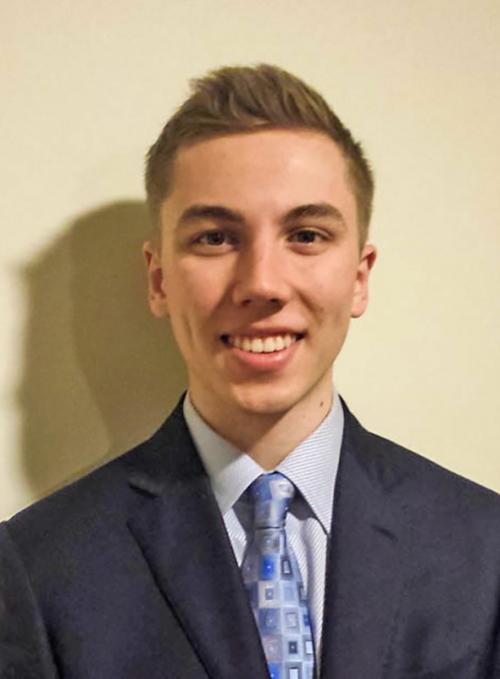Connor Foster '15
Major: Biological Sciences
Hometown: Woodbridge, CT
Why did you choose Cornell?
Cornell has always been a leader by providing an education to anyone, regardless of the contemporary societal trends. That kind of leadership was something that really appealed to me. Also, Cornell gives undergraduates access to world-leading research, and I knew I wanted to be a part of that. I also think the beautiful campus makes Cornell a great place to be a student.
What is your main Cornell extracurricular activity -- why is it important to you?
I am involved in a number of activities that are important to me outside of academics, one of which is Project Generations, a club dedicated to bridging the gap between generations. As a part of this organization, I spent time each week for the past couple of years with a senior citizen in the nearby area. It has been a very rich experience for me, as I got to connect with someone who grew up in a very different time period. I am privileged to have gotten to know this man and his wife and we shared many meaningful conversations as we got to know each other.
What was your most profound turning point while at Cornell?
In the fall of my junior year, I took autotutorial biochemistry taught by Jim Blankenship, and I was immediately enthralled. I poured over the textbook as though it were a mesmerizing novel, often going well beyond the assigned readings. I continued to pursue my interest in biochemistry by taking a graduate course in protein structure and function. I also became a TA for the autotutorial biochemistry course, where I could help other students, sharing my fascination with the topics. I was a TA for the course for three semesters. Taking the autotutorial biochemistry course was a turning point for me because it showed me that I wanted to pursue biochemistry alongside cell and molecular biology in my future.
What, if any, Cornell-related scholarships/special financial benefits did you receive?
I was awarded an Einhorn Discovery Grant for funding my research in the laboratory of Alexander Nikitin, M.D., Ph.D.
What accomplishments/activities are you most proud of while at Cornell?
I transferred to Cornell in the middle of my sophomore year, and I had such a great experience with Cornell Orientation that I decided to become an orientation leader. I was proud to be able to give back to a program that had really facilitated my adjustment to Cornell by helping new transfers and exchange students become acquainted with the university. I later returned to help with orientation as an orientation supervisor.
What, if any, research projects did you participate in at Cornell?
In the Nikitin Lab, I worked with CRISPR technology, a revolutionary tool in biotechnology. Specifically, I looked at the effects of CRISPR-mediated knockout of tumor suppressor TP53 in an immortalized ovarian surface epithelium cell line for my honors thesis. The research was fascinating, and I got to contribute to biomedical research.
What Cornell memory do you treasure the most?
The memory of opening my acceptance letter to Cornell stands out to me because it was the gateway to all the great things that awaited me at Cornell. But I have also really enjoyed the experiences I have had with friends at Cornell, like having dinner in Collegetown or going to the gym.
Who or what influenced your Cornell education the most? How or why?
A major influence in my Cornell education has been my undergraduate research experience. Not only did I get the chance to work alongside world-leading researchers, but I also got to conduct my own exciting research. Working independently has really enhanced my laboratory skills as well as my ability to think critically about research. Moreover, my experience has fed my passion for biomedical research and helped me decide my path after Cornell.
How did any of your beliefs or interests change during your time at Cornell?
I was a neuroscience major before I transferred, but shortly before coming to Cornell, aspects of cell biology had peaked my interest. As I explored upper level biology courses at Cornell and eventually a couple graduate courses, my interests crystallized around cell and molecular biology as well as biochemistry. Working in the Nikitin Lab has also honed my fascination with the biology of cancer. I hope to one day be a part of translational research that can bring discoveries in the lab to the bedside of patients.
What do you value about your liberal arts education?
I was a neuroscience major before I transferred, but shortly before coming to Cornell, aspects of cell biology had peaked my interest. As I explored upper level biology courses at Cornell and eventually a couple graduate courses, my interests crystallized around cell and molecular biology as well as biochemistry. Working in the Nikitin Lab has also honed my fascination with the biology of cancer. I hope to one day be a part of translational research that can bring discoveries in the lab to the bedside of patients.
What are your plans for next year; where do you see yourself in 10 years?
I am in the process of applying to combined MD/PhD programs, and I will take a gap year to do research. Eventually, I hope to be a part of translational research, which means I would be engineering new solutions to people's medical problems. Hopefully one day I can help to change people's lives for the better.




